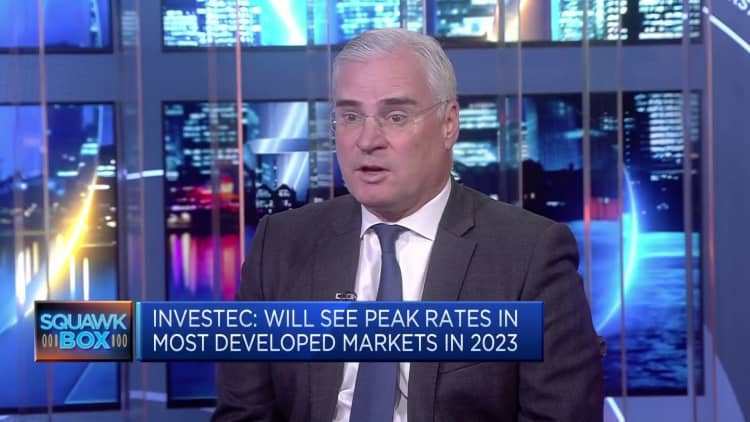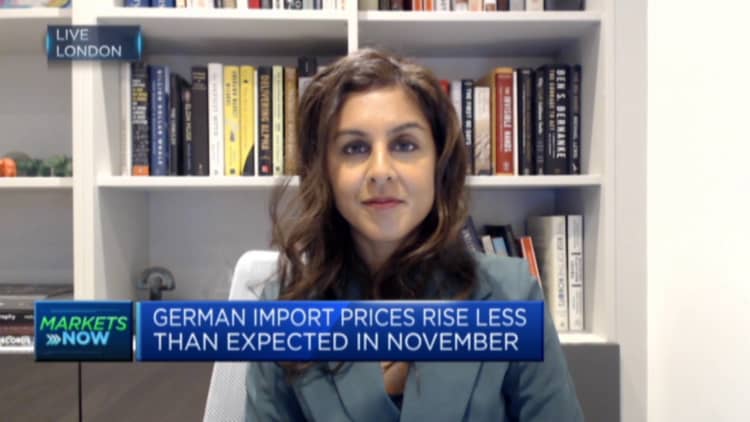
People walk along Waterloo Bridge past the City of London skyline, the capital’s financial district. U.K.-focused equity funds saw record outflows in 2022.
Sopa Images | Lightrocket | Getty Images
LONDON — U.K. GDP grew 0.1% in November, according to new data Friday from the Office for National Statistics, defying economists’ expectations and reducing the likelihood that Britain entered a technical recession in the fourth quarter.
A Reuters poll of economists had forecast a 0.2% contraction amid a bleak overall picture for the British economy.
The third quarter of 2022 saw a 0.3% contraction, but after a 0.5% expansion in monthly real GDP in October and the surprise 0.1% growth in November, a technical recession (two consecutive quarters of negative growth) appears to have been averted for now.
“Output in consumer-facing services grew by 0.4% in November 2022, following growth of 1.5% (revised up from a growth of 1.2% in our previous publication) in October 2022; the largest contribution to growth came from food and beverage service activities in a month where the FIFA World Cup started,” the ONS said in its report Friday.

The boost in services seemingly offset some of the negative impact of mass strike action across the U.K., particularly in the rail and postal sectors.
“While the direct impact of the strikes by postal and rail workers can be seen in the rail transport and postal and courier activities industries, we are not able to isolate the impact of these strikes from other factors across the wider economy,” the ONS said.
“However, there was anecdotal evidence to suggest this industrial action had an impact across a wide range of industries, for example wholesale trade and manufacture and repair of jewellery.”
‘Economic contraction is underway’
Despite the positive monthly surprise, the ONS noted that GDP shrank by 0.3% in the three months to the end of November, and economists said the recession may simply be delayed rather than averted.
“Today’s data can hardly disguise the likelihood that whilst recessionary conditions may be shallow, an economic contraction is underway,” said Jeremy Batstone-Carr, European strategist at Raymond James.
“What’s more, the effects of the Bank’s monetary tightening are still to feed through the economy fully. Together with the corporation tax increase to 25% and the expiration of the tax reduction on new investments, the economy only stands to contract further.”
The Bank of England has projected that the U.K. economy will experience at least a four-quarter recession, its longest on record.
“Production fell by 0.2% suggesting that, while Q4 as a whole may now show modest growth, the outlook going forward remains difficult, particularly given that services consumption can be expected to be curtailed as the cost of living crisis intensifies this year,” Stuart Cole, head macro economist at Equiti Capital, told CNBC via email Friday.

“With the spending boost from the World Cup and Christmas now behind us, industrial action spreading and significant tax rises due to hit consumer pay packets in April, the BoE’s forecast of a recession looks set to be delayed rather than avoided.”
The central bank’s aggressive monetary policy tightening trajectory looks set to persist in the short term as inflation continued to run into double digits in November, albeit marking a slight decline from October’s 41-year high.
Combined with a cost-of-living crisis caused by soaring food and energy prices, widening industrial action and unprecedented pressure on the country’s health service, consumer spending power is not likely to endure beyond the Christmas windfall. The increased cost of borrowing will likely exert further downward pressure on activity.
“Policymakers are keen to see heat taken out the economy because this will help to bring inflation down, which will eventually end the continuous rise in interest rates,” said Sophie Lund-Yates, lead equity analyst at Hargreaves Lansdown.
“Ultimately, it’s nice to see the U.K. squeeze out half an ounce of economic growth, but very real challenges persist.”
